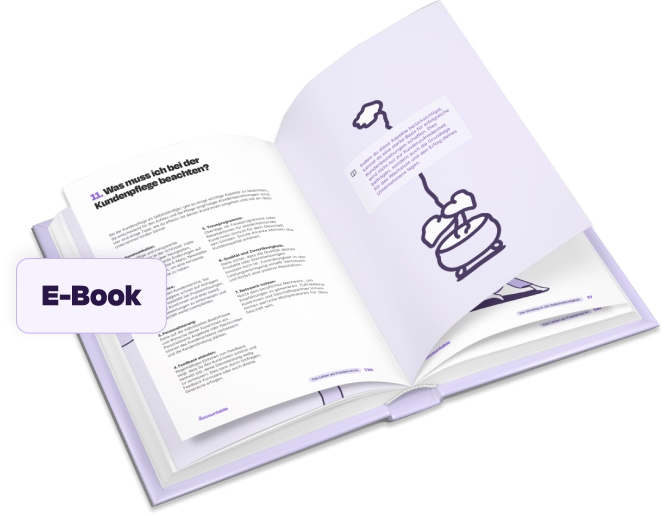For many freelancers, business trips, both within Germany and abroad, are part of the job. But what many don’t realize is how much tax they could save with proper travel expense documentation. In this article, we’ll show you how to make the most of the Verpflegungspauschale (daily meal allowance) as a self-employed professional.
Even though the process can be a bit more complex for freelancers than it is for regular employees, who simply collect their receipts and hand them over to their employer, tracking your travel expenses is always worth it if you’re self-employed. One keyword here: Verpflegungspauschale (flat-rate meal allowance).
A business trip doesn’t just mean working on-site with a client. It also includes attending trade shows, training sessions, or basically any out-of-office appointments that support your professional development. And the good news is: you can deduct all the related costs in your tax return. That includes travel, accommodation, incidental expenses and yes, food too. The specific allowance that covers meal costs is called Verpflegungsmehraufwand (additional meal expenses).
The idea behind it is simple: when you're on a business trip, you don’t have access to your own kitchen, so you’re more or less forced to eat out - at restaurants, cafés, bakeries, or wherever else you can grab a bite. That leads to higher costs, and to help ease the financial burden, the Verpflegungspauschale can be applied.
One major upside of this flat-rate allowance: you don’t need to keep every single receipt from your meals on the road, so no more fishing around for slips from highway rest stops or snack bars.
💡 Tip from Accountable: Download the free Accountable tax app to scan receipts on the go - so you never miss a deductible expense again! In this article, we walk you through the 9 most relevant allowances for freelancers.
In Germany, the Verpflegungspauschale (flat-rate meal allowance) follows a simple two-tier system:
This flat-rate system saves you from having to document every sandwich or coffee along the way and still helps you reduce your tax bill.
When you're traveling abroad for business, the Verpflegungspauschale (meal allowance) works a little differently. The daily rates vary depending on which country you're visiting and in some cases, even by region within that country. Also important: these rates are updated regularly. So before you head off on an international trip, it’s a good idea to check the current allowance rates. You’ll find the official list on the website of the German Federal Ministry of Finance.
Things can get a bit more complicated if you’re staying at a hotel where meals are included in the booking. In those cases:
The key is that these meals must be itemised on the invoice - only then does the deduction apply.
This also goes for meals you receive for free at conferences, workshops, or similar events, or even if you’re invited out to eat. And yes, that includes private invitations. So if a friend or relative happens to live in the city where you’re attending a meeting and treats you to lunch, you’re still expected to deduct 40% from your daily allowance.
💡Important to know: the total amount of deductions can never exceed the daily allowance. So if the calculated deduction would push the number into the negative, it’s simply set to €0 for that day - never less.
The Verpflegungspauschale (flat-rate meal allowance) is a great way for freelancers and self-employed professionals to deduct food expenses when traveling for work. But while the concept is similar to what's available for employees, there are some important differences- especially when it comes to how and when these allowances need to be reduced.
As a general rule, your Verpflegungspauschale (flat-rate meal allowance) must be reduced if meals are already provided at no extra cost - such as a hotel breakfast or meals included at an event. However, for the self-employed, some special rules apply:
Example 1: Training trip with hotel breakfast
Freelance editor Tina travels from Munich to Berlin for a training session. Her hotel includes breakfast, listed separately at €15. During the seminar, lunch is provided for free.
Breakdown:
Total claim: €14 + €28 + €14 = €56
Example 2: Business meeting with a lunch invitation
IT specialist Martin travels from Cologne to Frankfurt for a meeting and is invited to lunch by his client. The trip lasts more than 8 hours.
Breakdown:
Total claim: €14
💡 Accountable Tip: Want to learn how to claim all your travel costs properly? Check out our guide on how to submit your full business travel expenses!
As a freelancer or self-employed person, you can take advantage of the Verpflegungspauschale without having to follow the strict deduction rules that apply to employees. One of the biggest benefits is that you don’t need to keep every single meal receipt - making the process much simpler.
💡 Accountable is the tax solution built for the self-employed.
Download the free app or create your account online to get full control over your bookkeeping and tax returns from day one. And if you’ve got questions about flat rates or anything else - our team of tax coaches and our AI tax advisor are always happy to help you!
The Verpflegungspauschale is a daily flat-rate allowance that helps you deduct meal expenses during business trips - without needing to keep every single food receipt. It’s designed to compensate for the extra cost of eating out while away from home.
Yes, but with some limitations. If you receive a free meal, whether from a client, an event, or even a friend, you’re technically supposed to reduce your daily allowance by 40% for lunch or dinner, or 20% for breakfast. That said, as a freelancer, you generally don’t have to reduce your allowance for meals offered without charge, unless you're dealing with hotel costs.
Nope! That’s one of the main perks. The Verpflegungspauschale is a flat rate, so you don’t need to collect receipts for meals. Just make sure you track your travel dates and durations correctly, it’s the length of your trip that determines the allowance.
Meal allowance rates differ by country and sometimes even by region. These rates are updated annually. You can always find the latest official figures on the website of the German Federal Ministry of Finance before your trip.
As a self-employed person or freelancer, you include the Verpflegungspauschale as part of your business expenses (Betriebsausgaben) in your tax declaration. This reduces your taxable income, so it’s important to keep accurate records of your business trips. If you use tax software or work with an accountant, they can guide you on the exact place to enter these expenses.
20 Kapitel knallhart recherchiert und vom Steuerprofi geprüft
Kostenlos herunterladen

Author - Markus Thomas Boldt
Markus is an experienced tax advisor partner at Accountable, where he plays a crucial role in supporting and consulting the company’s financial and tax strategies.
Who is Markus ?Thank you for your feedback!
Useful
How much income tax is deducted from your income is largely determined by your tax class. There are ...
Read moreWorking as a self-employed professional has many advantages: You are your own boss and you can choos...
Read moreWorking with international clients can be tricky, depending on where exactly they’re located, whet...
Read moreMir wurde sehr schnell und kompetent geholfen. Der Kontakt war super freundlich und zuvorkommend! Auch für eine weitere Rückfrage wurde sich mit viel Geduld die Zeit genommen, um mir den Sachverhalt detailliert zu erklären.
Christine Höhne
Die Erklärungen waren total plausibel und ich habe mich über die zeitnahe Antwort gefreut.
Lina Gertzmann
Ich bin immer sehr zufrieden mit euren Antworten, die auch immer innerhalb von 24 Stunden erfolgen.
Sandy Kratochwil
Der Umgangston ist super freundlich! Die Antworten kommen immer schnell und sind qualitativ echt gut und verständlich!
Benedikt Schönauer
Meine Erfahrungen mit Accountable sind bisher nur Positiv. Ich als Kleinunternehmer habe jetzt alles in einer App und es ist super easy zu handhaben. Meine Buchhaltung war noch nie so leicht. Ein mega Pluspunkt ist noch, dass man ein Kostenloses Geschäftskonto einrichten kann, welches direkt mit allen Buchhaltungsfunktionen verknüpft ist.
"Tim Friedrichs"
Mit Accountable habe ich meine Buchhaltung im Griff, kann easy meine Umsatzsteuervorauszahlungen einreichen und Rechnungen stellen. Die Steuer-Coaches helfen mir immer schnell, wenn ich mal eine Frage habe. Durch Accountable komme ich bisher locker ohne Steuerberater:in aus. Und wenn ich doch mal Bedarf habe, kann ich mir über Accountable ein/e Expert/in buchen. Alles in allem eine runde Sache. Ich habe Accountable schon oft weiterempfohlen. (Und ganz ehrlich, das Logo von Accountable ist ja wohl sowas von nice.)
Ute Mayer-Dohmen
immer bemüht alle Fragen und Probleme schnell zu klären.
Halil Ibrahim Baran
Arbeiten mit Accountable ist für mich sehr hilfreich und meinen Anliegen werden schnell bearbeitet. Eine der besten Entscheidungen die ich dieses Jahr getroffen haben.
"Hardy Thiele"
konkrete Antworten auf Fragen, gute Vorbereitung und Kommunikation untereinander, sehr gut!
Nils Ohlsen
Hallo Simon, bin Dankbar das ich Accountable benutzen darf. Ich brauche aber Bitte eine Antwort auf mein Anfragen ùber die Steuercoaches, dies dauert zu Lange gerade while ich dann warte sehr Lange auf eine Antwort obwohl ich in den Promax Version bin. Bitte daher um einen Antwort auf mein Anliegen gerade geht es um die EKSteurerklarung von 2024. Danke und einen schønen Tag noch. Freundlichen Grùssen aus Lùbeck, Stuart Brown
Stuart Brown